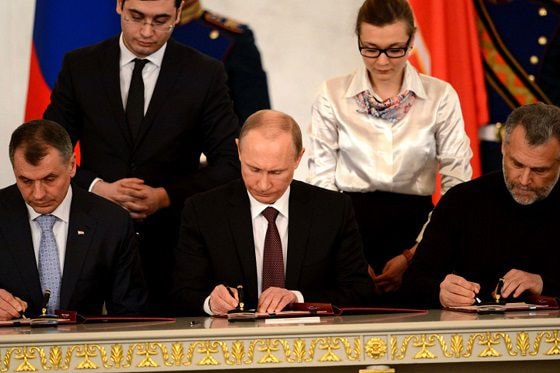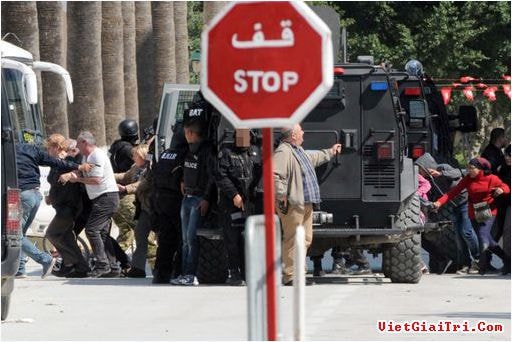The world last week: There will be many challenges!
(Baonghean) - March 18th marked the first anniversary of Crimea's annexation by Russia, an annexation that is considered to have opened a new chapter for a multipolar world. As a result, the confrontation between Russia, the West and the US became more tense than ever; or the fact that Israeli Prime Minister Benjamin Netanyahu won the election for a fourth term with hawkish policies in the foreign policy field and the terrorist violence that swept through Tunisia - a country that was considered peaceful in the "Dark Continent" because it was not affected by the protest movement to overthrow the government directed by the US and the West - were all notable events in the past week...
Annexation of Crimea - pros and cons
Until now, after 1 year, the Crimean peninsula has returned to the motherland of Russia after 2 million residents here held a referendum, causing an unprecedented tense confrontation since the Cold War between Russia and Western countries and the United States.
Sanctions are constantly being introduced to put pressure on each other and the losers from these sanctions are the Russians. However, the price of taking back Crimea compared to the sanctions is “acceptable” according to observers.
 |
| President Putin (center) during the signing ceremony of the treaty to annex Crimea to Russia on March 18, 2014. Photo: Getty Images AP |
Crimea is a part of Russian history. During the Great Patriotic War, this peninsula was the place where Nazi Germany tried to conquer and it was also here that witnessed the great battle of the Soviet Red Army that defeated Hitler's powerful army as a springboard to expand the liberated zone, making an important contribution to the campaign to liberate Ukraine and most of Europe.
On February 19, 1954, the Presidium of the Supreme Soviet of the Soviet Union issued a decree to transfer Crimea to the Ukrainian Soviet Socialist Republic. This transfer was considered a "gift" to celebrate the 300th anniversary of Ukraine becoming a part of Russia. Not only is it a part of Ukraine's history, Crimea is an extremely important geopolitical and geostrategic location that has a controlling significance for the security of the territorial waters of countries on the Black Sea coast. This is also where the Russian Black Sea Fleet is stationed with more than 70% of its weapons and military equipment.
The Ukraine crisis broke out, culminating in the Maidan incident that overthrew the US-directed government of President Viktor Yanoukovitch, leading to the risk that this geostrategic position would fall under NATO control.
If so, this would be an unpredictable threat to Russia's security. Meanwhile, the majority of the residents on this peninsula are Russians, so they do not like the West and the United States, so they always want to return to "living under the same roof" on the motherland of Russia. And so, after the referendum on March 16, 2014, in accordance with the wishes of the people on the Crimean peninsula, Russia welcomed this peninsula with open arms.
By taking over Crimea, Russia has not only brought a better life to its "lost children" but also occupied a geopolitical and geostrategic position to ensure national safety and security against external threats, specifically NATO.
For many years, the North Atlantic Treaty Organization has considered Russia as an opponent and they have always wanted to expand their territory to countries in the post-Soviet space to control Russia, especially in the defense field.
Because even though the Cold War is over, there are always differences in views between Russia and NATO, especially in solving problems and hot spots in the world.
While NATO, headed by the US, always maintains a tough stance, using military force to impose its will, Russia has the opposite view.
Thus, Moscow's acquisition of Crimea is considered a painful blow to NATO's ambition to contain Russia, thereby increasing Russia's influence in the international arena.
Observers even said that this had ended a unipolar world where weak countries were always oppressed and oppressed. However, every coin has two sides, and the other side of the coin named Crimea is a series of blockade, isolation, and embargo measures that caused the Russian economy to fall into a serious crisis, even at times on the brink of bankruptcy.
The Ruble lost value, and Western investors, not wanting to take risks, rushed to withdraw capital from the market, making people's lives extremely difficult due to rising inflation, causing prices to skyrocket... And on the 1st anniversary of Crimea becoming Russian territory, President V. Putin declared that he would not return Crimea, despite sanctions from the West that would certainly increase tensions between the two sides.
However, if we look at this issue through the eyes of strategic analysts, Russia's annexation of Crimea will still be a great victory for Russia. Because it not only enhances the country's ability to protect itself from threats but also affirms Russia's reputation in the international arena.
Benjamin Netanyahu re-election: A new chapter in US-Israel relations
For a long time, the US and Israel have been known as two close and unshakable allies, because everyone knows that both the US and Israel have common interests. That is, the US and Israel are both "enemies" of many Muslim countries in the Middle East.
While the US wants Israel as a fulcrum to resolve conflicts if war breaks out with countries in this region, Israel also wants to rely on the US in the hope of becoming a regional power to impose what the Jewish state wants...
It is worth mentioning that in resolving some current tense issues related to the region, the leaders of the two countries have completely opposite views. For example, on the Iranian nuclear issue, while the US, specifically President Barack Obama, quickly ended the confrontation with the Islamic country; or the Middle East peace process was also resolved by the White House owner in a peaceful and constructive direction, Prime Minister Benjamin Netanyahu put forward opposite views.
| Benjamin Netanyahu re-elected (Internet photo) |
During his tenure, Prime Minister Netanyahu pursued a tough foreign policy. The Middle East peace process continued to face obstacles. Israel continued to build settlements in the West Bank and block tax revenues collected from Palestine, despite international opposition and the backing of some Western European powers.
Just before the election, Israeli Prime Minister Benjamin Netanyahu asserted on March 16 that if he was elected, “there would be no more Palestinian state.” Not only that, Prime Minister Netanyahu’s administration has continuously used words and actions to hinder negotiations on the Iran nuclear issue.
With his tough and conservative ideology, if he succeeds in forming a coalition government, the Israeli Prime Minister will certainly be determined to pursue the foreign policies he has been implementing recently, even though he will face opposition from the international community.
This has completely exhausted the patience of the White House leaders. After the preliminary results showed that incumbent Prime Minister Benjamin Netanyahu had won, US officials have continuously sent out messages to "control" the hawkish leader of the Jewish country. Among them is the possibility of withdrawing the diplomatic "shield" for Israel at the United Nations that Washington has pursued for decades.
Remember in the past, every time the United Nations voted to pass a bill against Israel, the US always used its veto power as an umbrella to protect the Jewish state. The question is why Benjamin Netanyahu took such a risk? Surely in his calculations, this Prime Minister thought that the Americans would not be able to "abandon" Israel. Because when they had built a powerful traditional ally in the Middle East, the US would not be foolish enough to turn its back.
But remember that, at present, the image of the US in the eyes of the countries in the Middle East region cannot be worse than the image left by the Jewish state. If the P5+1 (including the US) satisfactorily resolves the Iranian nuclear issue, it means that America's biggest "enemy" will no longer exist. Therefore, if it continues to pursue a hard-line hawkish policy, the relationship between the US and Israel will further decline and the US has every reason not to cooperate with this Jewish country.
The shadow of IS lands in Tunisia
As a country that is not outside the influence of the “Arab Spring” movement directed by the West, causing countless instabilities in the Middle East and North Africa. First was the collapse of the Hosni Mubarak dictatorial capitalist regime in Egypt, then came the turn of Libya, Syria…
At first, people thought that when the “Arab Spring” swept through, it would open a new era in the region’s politics. However, when this movement passed, the consequences were only political and economic instability, civil war and the rise of terrorist organizations…
Tunisia, for one, seems to have ended the “Arab Spring” no worse than it began. The Sunni Muslim nation of 11 million avoided civil war and managed to create democratic institutions that have so far mediated between competing factions and ideologies. The formula for Tunisia’s relative success seems simple: Limit foreign interference, avoid sectarian politics, and encourage compromise on all sides.
 |
| Internet photo |
However, after the terrorist attack on March 17 that killed 22 people in the country considered the most stable in the Middle East and North Africa, people realized that the consequences of the "Arab Spring" had begun.
With an economy that relies heavily on tourism, the Islamic State (IS) claiming responsibility and calling the attack “The First Drop of the Rain” is a red alert signal for the country. What is special is that the attack occurred right in the area of the Tunisian Parliament building - a heavily guarded area where the country's parliamentarians were discussing an anti-terrorism law.
Thus, the shadow of IS has spread into Tunisia, which will be a big challenge for the coalition against the Islamic State, because not only will it narrow the influence of this organization, but it will also expand and widen.
Southern Scenery

.png)






